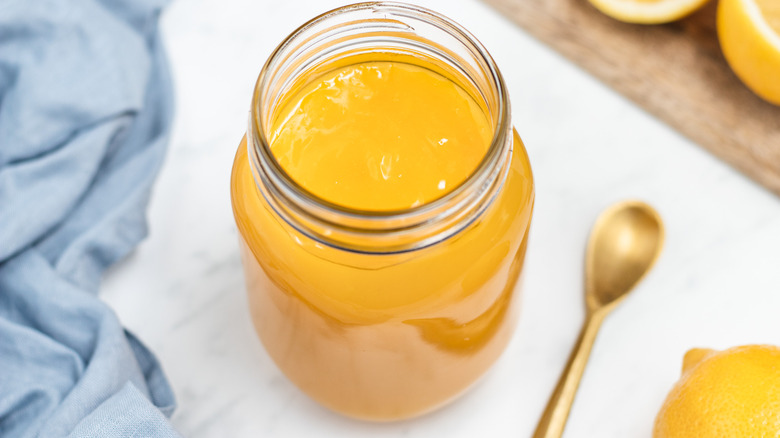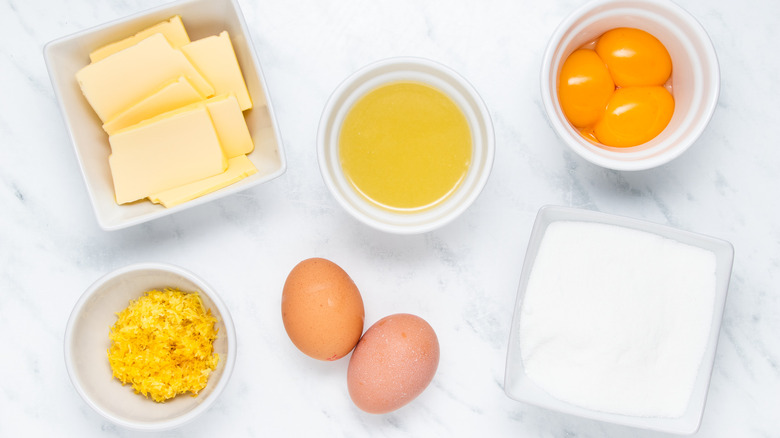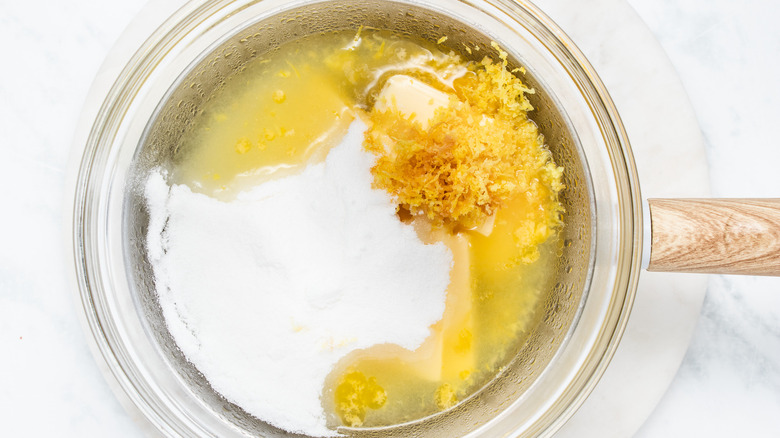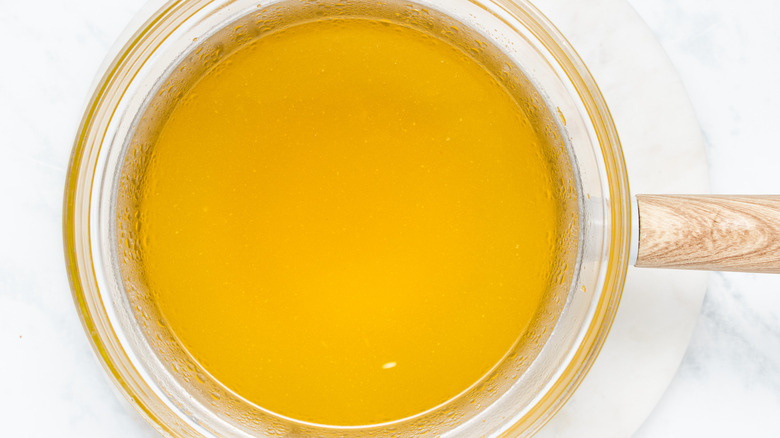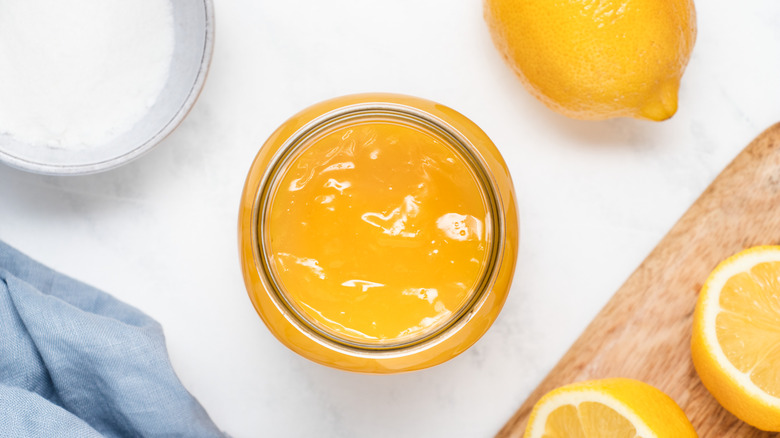Classic Lemon Curd Recipe
If you're a fan of the long-running "Great British Bake Off," you've probably seen the contestants use a few gallons of lemon curd in their pastries. It's a pretty popular ingredient these days, although it's no new fad. It dates back to the 1800s, when the "curd" part of the name was more literal, since the food was the byproduct of using lemon juice to curdle milk. The modern version, however, is a far more appetizing custard with no actual curdling involved — just lemon juice and zest combined with sugar, butter, and eggs.
Recipe developer Catherine Brookes describes the lemon curd she makes as having "the perfect balance of sweetness and tartness. It's less labor-intensive and time consuming to make than you might think, too, plus you can put the finished product to a number of different uses." As Brookes tells us, lemon curd is "vibrant, versatile, and so delicious."
Assemble the ingredients for the lemon curd
Lemon curd does not require too many ingredients. You'll need the juice and the zest of 4 lemons, as well as sugar, unsalted butter, 2 whole eggs, and 3 egg yolks.
Heat the butter, sugar, and lemon
Whisk the whole eggs together with the 3 yolks. If you have a double boiler, you can put it to use, but if not, you'll be balancing a heatproof bowl over a pot filled with about 1-inch of simmering water. Make sure the bowl is not actually in the water, though, but just hovering over it.
Put the lemon juice, zest, sugar, and butter in the bowl, or in the top section of the double boiler. Stir the mixture, until the butter melts, and the sugar dissolves.
Add the eggs, and cook until the curd thickens
Pour the eggs into the butter and sugar mixture slowly, whisking the mixture as you pour. Keep whisking the mixture until it thickens up enough to coat the back of a spoon, about 10 to 15 minutes.
Don't worry if the lemon curd still looks a bit thin and drippy after 15 minutes. Brookes assures us that "The curd will thicken more as it cools." Let it cool for at least 1 hour before you try to use it, that way it will be thick enough.
What you can do with lemon curd
Brookes says that the lemon curd "[is a] great spread on toast or scones." She also advises mixing it into yogurt or granola, or you could combine all three to make a breakfast parfait. You can also use lemon curd as a dip for fruit, a cake filling, or topping. If you're feeling extra-ambitious, though, why not use it to make these berry-topped meringue bites or this lemon meringue angel food cake? Both of these recipes would be good ways to use up those extra egg whites you'll have leftover from making the lemon curd. You needn't limit yourself to only dessert recipes, either, since you can even put the lemon curd to use in a savory dish, such as this lemon curd and pepper roast chicken.
Whatever you choose to do with your lemon curd, though, don't wait too long to use it. "The lemon curd will keep well in an airtight container in the fridge for up to 2 weeks," says Brookes.
Classic Lemon Curd Recipe
This classic lemon curd recipe is so versatile, it can be used with cakes, desserts, and even savory dishes.
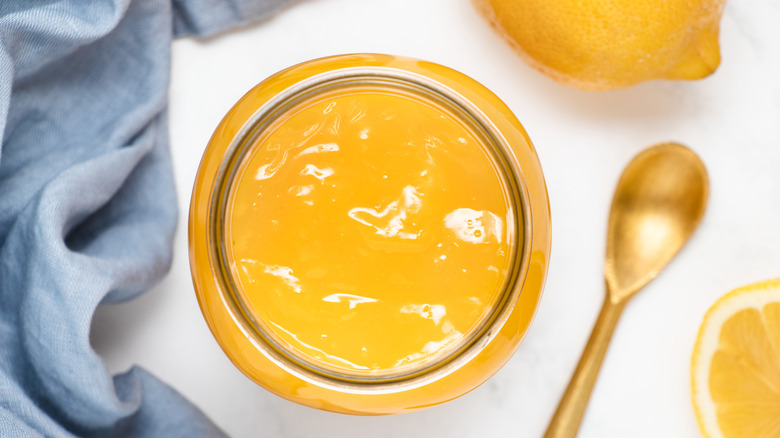
Ingredients
- 2 eggs
- 3 egg yolks
- 4 lemons, juiced
- 2 tablespoons lemon zest
- 1 cup sugar
- ½ cup unsalted butter
Directions
- Whisk together the egg yolks and eggs.
- Fill a saucepan with approximately 1-inch of water, and bring it to a low simmer. Rest a heatproof bowl on top of the pan, ensuring that it isn't touching the water.
- Put the lemon juice, zest, sugar, and butter in the bowl, and stir until the butter is melted, and the sugar has dissolved. Slowly pour the whisked eggs into the bowl, whisking constantly as you go.
- Continue whisking the mixture constantly for 10 to 15 minutes, until it is thick enough to coat the back of a spoon. Cool the lemon curd for 1 hour before using, and store the lemon curd in the refrigerator for up to 2 weeks.
Nutrition
| Calories per Serving | 239 |
| Total Fat | 14.0 g |
| Saturated Fat | 8.1 g |
| Trans Fat | 0.5 g |
| Cholesterol | 125.3 mg |
| Total Carbohydrates | 28.2 g |
| Dietary Fiber | 1.0 g |
| Total Sugars | 25.8 g |
| Sodium | 20.2 mg |
| Protein | 2.6 g |
